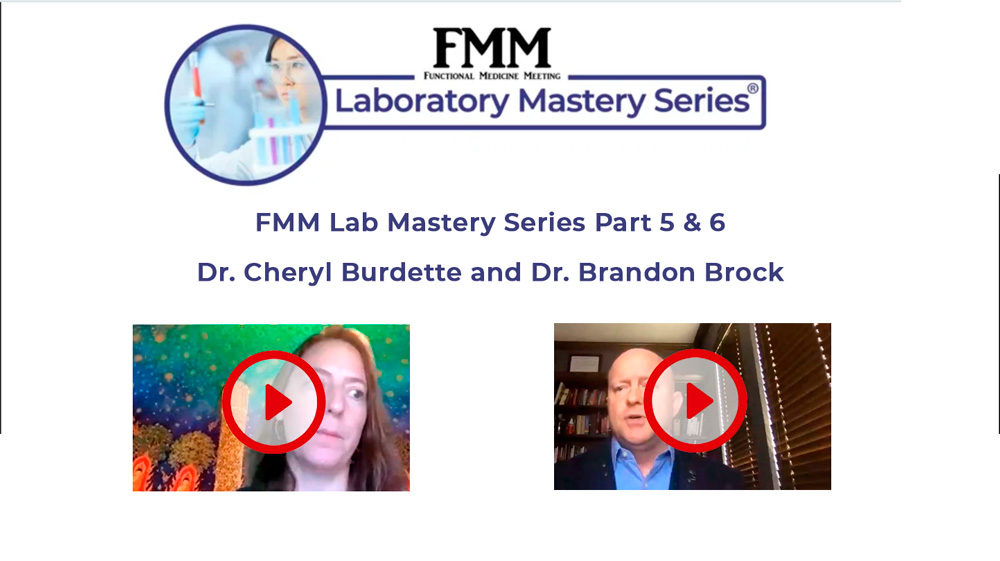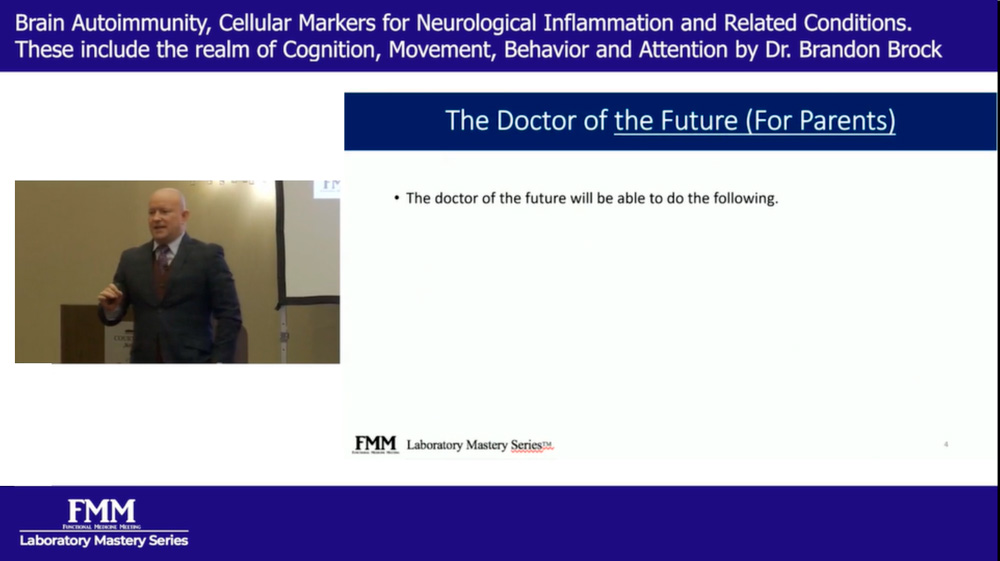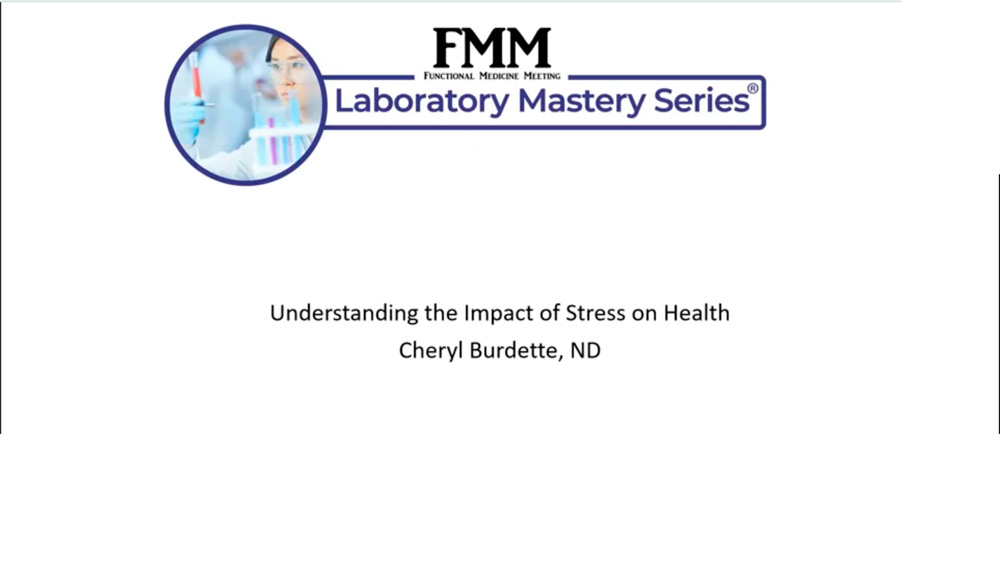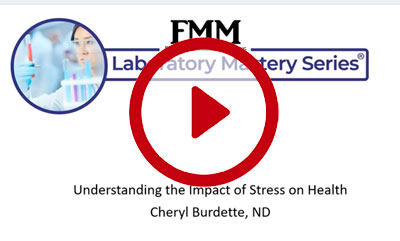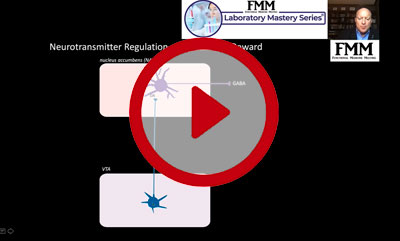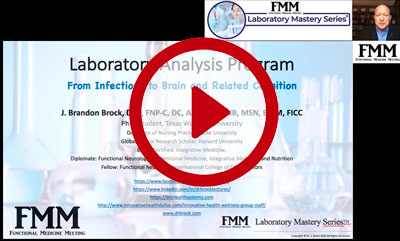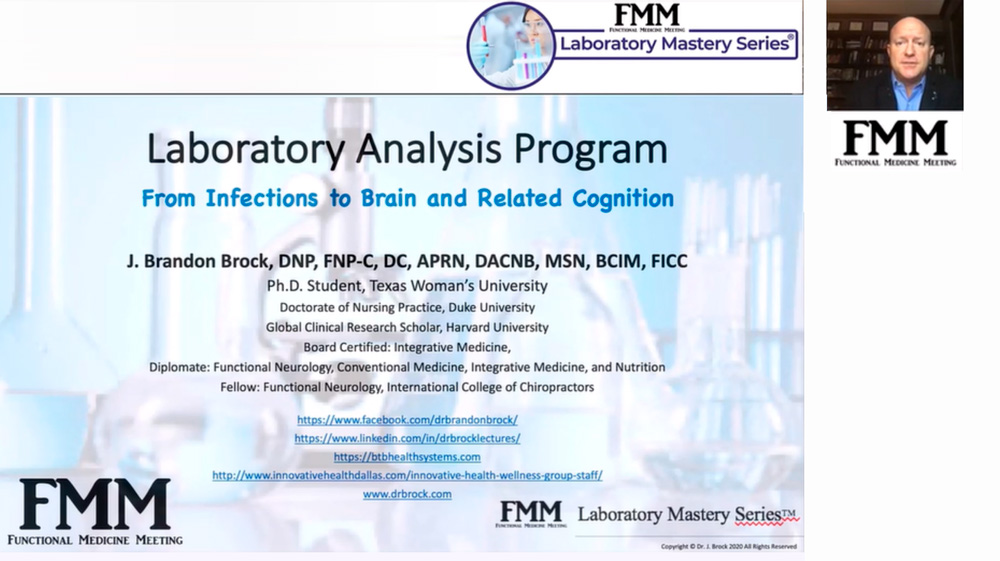Description
FMM Lab Mastery Series Part 5 & 6 Webinar
Dr. Brandon Brock presents on infectious disease, PANDAS, ADD and more
Program Description (Comprehensive):
Explanation of hormones and laboratory analysis via blood, saliva, and urine is a vital component of healthcare that is imperative to ensure accurate and appropriate diagnosis, management and treatment of patients.
This program is designed to teach students from all practice types and styles to utilize this tool within their scope and means. Learning disease patterns, severity and ongoing outcome assessment will aid the practitioner when it comes to the utilization of nutrition, diet, exercise, medication, referral needs and outside diagnostic necessity.
This program over its continuum will allow each practitioner the chance to gain proficiency in reading, understanding, and the application of lab studies for baseline analysis and specific targeting of disease and pathological physiologic manifestation related to hormones.
Infectious disease
Review common infectious pathogens
Symptoms
Neurological and mental conditions
Transmitter components
Neural circuitry
Common conditions and diagnosis
Treatment components
A Whole Systems Synthesis to The Jagged Edges of Stress, As it relates to the Endocrine System
Three Part Analysis: Adrenal, Reproductive and Thyroid
Dr. Cheryl Burdette
No one denies that stress plays a major role in our health. Yet it is probably the least talked about component of care, especially relative to its known impact. From psoriasis, to IBS, to cancer stress is well researched player in the development of pathology. Sources are diverse, but the ultimate result of stress can be measured and assessed at key target endpoints. In the lecture we will examine the impact of stress on our systems from cardiovascular, endocrine and immune and how this influences pathology. We will review the interconnections between adrenal function, reproductive hormones and thyroid. We will review extensive research demonstrating the impact of stress on mitochondria and telomeres demonstrating its impact right down to the cell. While the matrix of stress is vast, there are focal points that help to manage its complexities. We will examine how the molecular similarities of stress manifest in common conditions of aging. We will review clinical protocols to decrease an environment of stress from emotional, physical and biochemical. There are practical common tools that manage the extremes of stress and are imperative, yet all too often overlooked, in our journey with health. Understanding the interrelationship of adrenals, thyroid and reproductive hormones helps in our ability to manage their interwoven relationships.
I. Sources of Stress
A. Emotional/Mental
B. Physical
1. Pollution
2. Infection
3. Sensory
C. Metabolic
D. Acute vs. Chronic
II. Cellular Consequences of Stress
A. Inflammasomes-from gut to mitochondria
B. Cell Defense Response
C. Inflammaging from the gut-from probiotics to Zonulin
III. Systems Impact of Stress
A. Immune
B. Cardiovascular
C. Endocrine and Hormone Disorders
1. Reproductive hormones
a. Estrogen
b. Testosterone
c. Progesterone
d. Thyroid
IV. Clinical management of Stress
A. Antioxidant Response Elements-flipping the switch in response to stress
B. Leaky gut therapies-Reversing the Inflammaging from the gut
C. Endocrine therapy from the intra to extracellular- a hormonal support
D. Shifting the paradigm of patient care-the individuality of the molecular matrix
E. Thyroid management
Learning Objectives Part 1: Adrenal Management
• To review cell signaling and pathology as it relates to stress and stress hormones
• Examine the literature as it applies to pathologies in the area of cardiovascular disease, things neurologic and cancer through the lens of stress
Evaluate methodologies for evaluating the impact of stress on the body and how to monitor efficacy of treatments applied to a physiologic response to stress
Learning Objectives Part 2: Reproductive Hormone Management
1. The listener will learn key concepts in hormone management in terms of managing an oxidative environment that contributes not only to menopausal symptoms but cancer risk.
2. We will review common markers of oxidative stress and their relationship to estrogen metabolism, menopausal symptoms, and how to treat.
L
Learning Objectives Part 3: Thyroid management
Objectives:
• Understanding thyroid from a functional approach
• Understanding how metabolic endotoxins from the gut interact with thyroid and cause dysregulation with production and receptor function
• Examine underlying connections of oxidative stress and how this creates
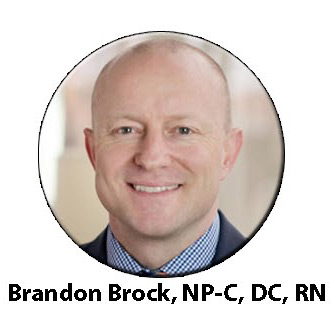 Dr. Brandon Brock is a practitioner in Dallas Texas who holds a Doctorate in Family Nursing Practice from Duke University, and a Doctorate in Chiropractic. He has a Diplomate in Functional Neurology, Nutrition, Conventional Medicine, and Integrated Medicine as well. He holds Fellowship status in 2Childhood Disorders, Neurology, Electro-diagnostic Medicine, Neurochemistry and is a member of the International College of Chiropractors. Dr. Brock is also a Global Clinical Research Scholar from Harvard Medical School.
Dr. Brandon Brock is a practitioner in Dallas Texas who holds a Doctorate in Family Nursing Practice from Duke University, and a Doctorate in Chiropractic. He has a Diplomate in Functional Neurology, Nutrition, Conventional Medicine, and Integrated Medicine as well. He holds Fellowship status in 2Childhood Disorders, Neurology, Electro-diagnostic Medicine, Neurochemistry and is a member of the International College of Chiropractors. Dr. Brock is also a Global Clinical Research Scholar from Harvard Medical School.
In Dallas Texas, he serves as chief clinician at Foundation Physicians Group. He enjoys teaching and providing educational support to facilitate learning for multiple groups and agencies. This includes topics that ranges from nutrition, and regenerative medicine to pharmacology and governmental policy.
Dr. Brock received the most outstanding functional neurology teacher of the year from the ACA council of Neurology four years straight and two times from IAFNR (International Association of Functional Neurology and Rehabilitation). He also received the humanitarian award from IAFNR. Dr. Brock and is also the honorable recipient of the prestigious Living Legacy Award from Samford Universities Ida Moffett School Nursing in 2015. He has also been the spotlight student at Duke University and is on the Scientific Advisory Board for the Mindd Foundation. His unique blend of clinical and teaching experience along with a background in medicine, chiropractic, neurology and nutrition has created a unique and integrated clinical background that has helped him treat difficult cases and offers comprehensive angles on education and clinical presentations. Dr. Brock is a founding partner and educator at BTB Health Systems and Functional Neurology Seminars.
 Dr. Cheryl Burdette
Dr. Cheryl Burdette
Current Position: Director of Naturopathic Medicine at Progressive Medical. I serve as a staff physician, and educational director. I have been in private practice since 2001. I manage the Naturopathic residency program that is focused on integrative medicine and nutritional biochemistry. I am the Research and Outreach director for Xymogen, and Inc.500 supplement company, and serve on their BOA. I am owner and president of a nutritional lab, Dunwoody Labs, for which I design clinical profiles and train clinicians in their utilization. At Dunwoody labs I am also involved in nutritional trials and translational research. I am chief advisor for on-going clinical trial department of the laboratory. I also serve on an independent IRB giving feedback concerning various studies in the area of integrated medicine. I lecture internationally and nationally for IFM, A4M, MMI, and ACAM as well as many other conferences. I wrote and designed the curriculum for Advanced Medicine’s Academy online certification program. I am called upon yearly to do grand rounds at all the major Naturopathic medical schools. I teach Clinical and Nutritional Oncology at the University of Bridgeport and am part of the faculty at the University of Miami that is the first allopathic school to require integrative medicine. I am also adjunct faculty at George Washington University, the first PhD program in integrative medicine.

